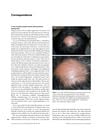63 citations,
July 2018 in “The journal of investigative dermatology/Journal of investigative dermatology” JAK inhibitors can effectively reverse hair loss in people with alopecia areata.
 January 2011 in “International Journal of Trichology”
January 2011 in “International Journal of Trichology” The document concludes that doctors should recognize congenital triangular alopecia to avoid unnecessary treatments, as it does not respond to steroids like alopecia areata does.
9 citations,
June 2023 in “Cells” Certain natural and synthetic compounds may help treat inflammatory skin diseases by targeting a specific signaling pathway.
 January 2018 in “Springer eBooks”
January 2018 in “Springer eBooks” PDE inhibitors, especially PDE4 inhibitors like apremilast, are effective for certain inflammatory skin conditions but have side effects and can be costly.
 March 2022 in “IntechOpen eBooks”
March 2022 in “IntechOpen eBooks” Botulinum Neurotoxin-A can treat acne, oily skin, rosacea, hair loss, prevent scars, relieve nerve pain, reduce excessive sweating, and manage psoriasis, but more trials are needed to confirm its effectiveness.
 1 citations,
March 2023 in “Clinical, Cosmetic and Investigational Dermatology”
1 citations,
March 2023 in “Clinical, Cosmetic and Investigational Dermatology” Current treatments for Alopecia Areata have mixed success, and there's a need for better, more accessible options and support for affected individuals.
June 2020 in “Journal of Investigative Dermatology” The symposium highlighted the importance of genetics in understanding and treating complex skin diseases.
 5 citations,
May 2017 in “Journal of the European Academy of Dermatology and Venereology”
5 citations,
May 2017 in “Journal of the European Academy of Dermatology and Venereology” The study found no significant difference in stress hormone levels between people with alopecia areata and healthy individuals, suggesting that the disease is not caused by an overactive stress response system.
 44 citations,
November 1998 in “Australasian Journal of Dermatology”
44 citations,
November 1998 in “Australasian Journal of Dermatology” Accurate diagnosis is key for treating different kinds of hair loss, and immune response variations may affect the condition and treatment results.
 October 2023 in “Frontiers in medicine”
October 2023 in “Frontiers in medicine” Targeted immunotherapy could be a promising new treatment for hair regrowth.
 January 2024 in “Frontiers in immunology”
January 2024 in “Frontiers in immunology” Histone modification is key in treating chronic inflammatory skin diseases.
 3 citations,
May 2023 in “Precision clinical medicine”
3 citations,
May 2023 in “Precision clinical medicine” Researchers found four genes that could help diagnose severe alopecia areata early.
3 citations,
August 2018 in “Therapeutics and Clinical Risk Management” Corticosteroid therapy for alopecia areata can cause severe hip bone damage.
56 citations,
September 2010 in “Veterinary pathology” Certain mouse strains develop a skin condition similar to a human hair loss disease due to genetic defects.
 16 citations,
January 2021 in “Dermatology and therapy”
16 citations,
January 2021 in “Dermatology and therapy” An imbalance in gut bacteria is linked to skin immune diseases and may affect their outcomes and related health issues.
 January 2016 in “Journal of The Korean Medical Association”
January 2016 in “Journal of The Korean Medical Association” The document says how to diagnose and treat hair loss from alopecia areata, but there's no cure and treatments vary.
 4 citations,
January 2020 in “Lasers in Surgery and Medicine”
4 citations,
January 2020 in “Lasers in Surgery and Medicine” Using a 308-nm excimer lamp with minoxidil promotes hair growth in Alopecia Areata patients, especially younger ones or those with smaller bald spots.
 23 citations,
January 2020 in “Central-European Journal of Immunology/Central European Journal of Immunology”
23 citations,
January 2020 in “Central-European Journal of Immunology/Central European Journal of Immunology” Alopecia areata, a type of hair loss, is likely an autoimmune disease with a genetic link, but its exact cause is still unknown.
 9 citations,
May 2019 in “Journal of dermatological treatment”
9 citations,
May 2019 in “Journal of dermatological treatment” Apremilast helps regrow hair in hard-to-treat alopecia areata.
 11 citations,
July 2008 in “International Journal of Dermatology”
11 citations,
July 2008 in “International Journal of Dermatology” Greying hairs may be protected from alopecia areata.
 3 citations,
April 2022 in “Farmacia”
3 citations,
April 2022 in “Farmacia” Certain foods and supplements can help treat skin diseases alongside medication.
 1 citations,
October 2020 in “Journal of Investigative Dermatology Symposium Proceedings”
1 citations,
October 2020 in “Journal of Investigative Dermatology Symposium Proceedings” The summit concluded that new treatments like Jak inhibitors show promise for Alopecia Areata and personalized approaches are needed.
 June 2022 in “bioRxiv (Cold Spring Harbor Laboratory)”
June 2022 in “bioRxiv (Cold Spring Harbor Laboratory)” ILC1-like cells can cause alopecia areata by attacking hair follicles.
 20 citations,
June 2019 in “Experimental Dermatology”
20 citations,
June 2019 in “Experimental Dermatology” The research suggests that autophagy-related genes might play a role in causing alopecia areata.
 5 citations,
November 2021 in “Skin appendage disorders”
5 citations,
November 2021 in “Skin appendage disorders” Hair loss can cause stress and mental health issues, so treatments should address both the physical and psychological aspects, involving a team of dermatologists, psychologists, and hair specialists.
 October 2023 in “Frontiers in Medicine”
October 2023 in “Frontiers in Medicine” Dupilumab helped a 4-year-old grow hair back after another treatment failed.
22 citations,
January 2012 in “Mediators of inflammation” Nonantibiotic macrolides show promise for treating various inflammatory skin conditions.
 21 citations,
February 2012 in “Journal of the European Academy of Dermatology and Venereology”
21 citations,
February 2012 in “Journal of the European Academy of Dermatology and Venereology” Late-onset alopecia areata in Taiwanese patients is more common in women, usually starts at age 57, often involves less than 10% hair loss, and may have a minimal link to thyroid issues.
 January 2023 in “Indian Dermatology Online Journal”
January 2023 in “Indian Dermatology Online Journal” No single ideal JAK inhibitor for alopecia areata has been determined; JAK3 inhibitors may be promising with fewer side effects.
62 citations,
January 2015 in “Journal of Dermatological Science” New genetic discoveries may lead to better treatments for alopecia areata.






















